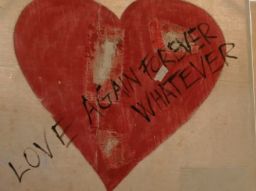Story highlights
Ali Lamu turns old fishing material and recycled items into artwork and handicrafts
The handmade creations are mostly made by old dhow sails, or 'tanga' in Swahili
The artisans paint thoughtful messages on the creations promoting love and peace
Clients can buy Ali Lamu's offerings from a small boutique on the island or online
One summer day back in 2008, fisherman Ali Omar went to see Daniela Bleattler, a Swiss photographer living in Lamu, the beautiful island off the Kenyan coast. Struggling to make a living, Omar asked Bleattler if she had a job for him. Bleattler didn’t, but asked him instead whether he could help her find any “tanga,” the old sails from the traditional dhows that she loved.
A couple of days later, the local fisherman returned with a magnificent brownish old sail, weathered by years of salt and storms from navigating the Indian Ocean waters. “It had a big hole in the center created by the wind and the old age of the material,” remembers Bleattler, who at the time had just come out of a relationship. “I just laughed and said to him, ‘if I do a big red heart around it, this will look just like my broken heart at the moment.’”
So Omar left again to return this time with tins of red and black paint he used for his dhow. Together, they started painting a big red heart around the hole; once done, Bleattler dipped the brush into the black paint and added the words “Love Again Forever Whatever.”
Read this: Fishing craft to foosball tables, furniture to float your boat

“We looked at it and we just loved it so much,” says Bleattler. “I said I think we should frame it and put in the shop of a friend of mine.” Less than two hours later, an American couple walked into the art store and stood in front of the broken heart holding hands. “They said ‘that is beautiful, how much is it?’” recalls Bleattler. “I had no idea and I just kind of said a (very expensive) price but they said ‘well, we want it” – it started exactly like this.”
Ali Lamu
What started was Ali Lamu, a business launched by Omar and Bleattler producing anything from whimsical paintings and high-end handbags to beautiful bed covers and cushions. Six years after their first sale, they have sold several broken hearts – as well as other designs – to customers from all over the world. Everything is handmade, created from old fishing material and whatever washes up on the shores of Lamu.
“We are making more and more,” says Bleattler. “We are actually in the process of thinking wider and bigger.”
Read this: Artist’s spectacular glasses ‘give trash a second chance’
Ali Lamu, which is also the name some locals use for Omar, has 34 permanent staff and sometimes employs as many as 70 people. The business has a couple of workshops on the island but most of the craftsmanship is done in the artisans’ homes. These are people who are usually Omar’s family members, friends and other local fishermen.
“Ali’s family is happy because of this business because they all have a job from this company.” says Juma Kilonzo, a friend and artisan. “We are the friends so we are close now like brothers,” he adds. “So we also depend on this company.”
“Wake Up And Love”
The artisans also paint thoughtful and uplifting messages on many of their designs, promoting love, peace and care for the environment – slogans like “Wake Up And Love,” “The Only Way to Save The World Is With My Heart” and “Heart That Loves Never Gets Old.”
“I just close my eyes and see what the day brings,” says Bleattler, describing where she draws inspiration for the messages adorning Ali Lamu’s one-of-a-kind creations. “Depending on the mood of the day,” she continues, “what is going on around the world and the people around me – the fishermen, the people I’m working with are my big inspiration, so it’s from them I find all these sayings.”
The company sells its designs from a small boutique on Lamu, mostly to tourists. But one of the main challenges for the business has been a drop in the number of people visiting the stunning island recently. Lamu, which is listed as a World Heritage Site by UNESCO, is very close to Somalia and has previously been targeted in terror attacks.
Watch this: Lamu deals with the tourism blues
“We do survive because of exports, otherwise we wouldn’t make it,” says Bleattler.
In hopes of attracting a bigger clientele, they’ve put themselves online so that people from all over the world can see their works and make custom orders.
“In 10 years I hope Ali Lamu can be all over the world,” says Omar. “So my company has a really good life.”






















